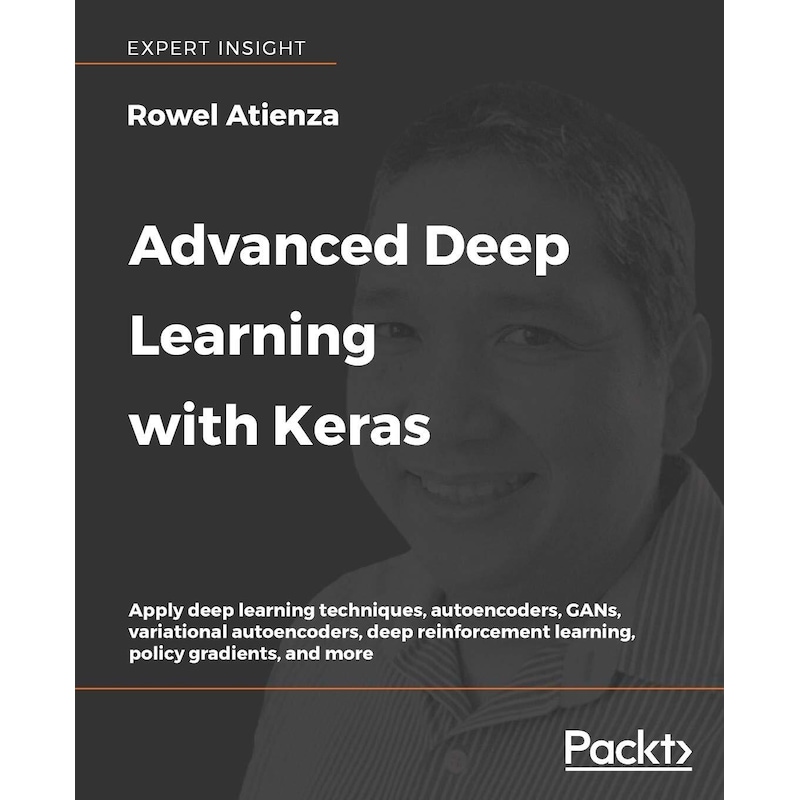
Publishers Note: This edition from 2018 is outdated and is not compatible with TensorFlow 2 or any of the most recent updates to Python libraries. A new second edition, updated for 2020 and featuring TensorFlow 2 and coverage of unsupervised learning using mutual information, object detection, and semantic segmentation, has now been published.A comprehensive guide to advanced deep learning techniques, including autoencoders, GANs, VAEs, and deep reinforcement learning that drive todays most impressive AI results.key FeaturesExplore the most advanced deep learning techniques that drive modern AI resultsImplement deep neural networks, autoencoders, GANs, VAEs, and deep reinforcement learningA wide study of GANs, including Improved GANs, Cross-Domain GANs, and Disentangled Representation GANsBook Description: Recent developments in deep learning, including Generative Adversarial Networks (GANs), Variational Autoencoders (VAEs), and Deep Reinforcement Learning (DRL) are creating impressive AI results in our news headlines - such as AlphaGo Zero beating world chess champions, and generative AI that can create art paintings that sell for over $400k because they are so human-like.Advanced Deep Learning with Keras is a comprehensive guide to the advanced deep learning techniques available today, so you can create your own cutting-edge AI. Using Keras as an open-source deep learning library, youll find hands-on projects throughout that show you how to create more effective AI with the latest techniques.The journey begins with an overview of MLPs, CNNs, and RNNs, which are the building blocks for the more advanced techniques in the book. Youll learn how to implement deep learning models with Keras and TensorFlow 1.x, and move forwards to advanced techniques, as you explore deep neural network architectures, including ResNet and DenseNet, and how to create autoencoders. You then learn all about GANs, and how they can open new levels of AI performance. Next, youll get up to speed with how VAEs are implemented, and youll see how GANs and VAEs have the generative power to synthesize data that can be extremely convincing to humans - a major stride forward for modern AI. To complete this set of advanced techniques, youll learn how to implement DRL such as Deep Q-Learning and Policy Gradient Methods, which are critical to many modern results in AI.What You Will Learn: Cutting-edge techniques in human-like AI performanceImplement advanced deep learning models using KerasThe building blocks for advanced techniques - MLPs, CNNs, and RNNsDeep neural networks - ResNet and DenseNetAutoencoders and Variational Autoencoders (VAEs)Generative Adversarial Networks (GANs) and creative AI techniquesDisentangled Representation GANs, and Cross-Domain GANsDeep reinforcement learning methods and implementationProduce industry-standard applications using OpenAI GymDeep Q-Learning and Policy Gradient MethodsWho this book is for: Some fluency with Python is assumed. As an advanced book, youll be familiar with some machine learning approaches, and some practical experience with DL will be helpful. Knowledge of Keras or TensorFlow 1.x is not required but would be helpful.;
P>About the Author: Rowel Atienza is an Associate Professor at the Electrical and Electronics Engineering Institute of the University of the Philippines, Diliman. He holds the Dado and Maria Banatao Institute Professorial Chair in Artificial Intelligence. Rowel has been fascinated with intelligent robots since he graduated from the University of the Philippines. He received his MEng from the National University of Singapore for his work on an AI-enhanced four-legged robot. He finished his Ph.D. at The Australian National University for his contribution on the field of active gaze tracking for human-robot interaction. Rowels current research work focuses on AI and computer vision. He dreams on building useful machines that can perceive, understand, and reason. To help make his dreams become real, Rowel has been supported by grants from the Department of Science and Technology (DOST), Samsung Research Philippines, and Commission on Higher Education-Philippine California Advanced Research Institutes (CHED-PCARI).
We ship Australia-wide, including all major cities such as Sydney, Melbourne, Brisbane, Perth, Adelaide, Canberra, Newcastle, and the Gold Coast.
Same-Day Dispatch:
Orders placed before 12pm (AEST) are guaranteed to ship the same business day. Orders placed up until 1pm often still ship same day, but this is not guaranteed.
Estimated Delivery Timeframe:
• Metro areas in major cities like Melbourne, Sydney, Brisbane, and Canberra typically receive their orders within 1–2 business days.
• Regional and rural areas, or deliveries to states such as WA, SA, NT, and TAS, may take up to 10 business days, depending on location and courier performance.
Delivery times may vary slightly during peak periods, but we always aim to get your order to you as quickly as possible.
We offer a 30-day satisfaction guarantee on all purchases.
Returns:
Returns are accepted within 30 days of receiving your item. Items must be returned in their original packaging and in the same condition as when they were received. Change-of-mind returns are accepted only for items that are new and sealed. Items that are used or no longer in their original condition may not be eligible for a full refund.
Defective Items:
If your item arrives damaged or faulty, please contact us as soon as possible, and we’ll arrange a return or replacement where applicable.
Warranty:
We do not provide warranty coverage beyond the initial 30-day period. For any issues arising after this time, warranty claims must be made directly with the manufacturer in accordance with their terms.
Estimated Delivery Time Frame: 5 - 10 business days


